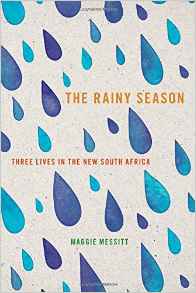 Sometimes a writer can be loudest by being the most quiet, an effect brilliantly achieved by Maggie Messitt in her first book, The Rainy Season: Three Lives in the New South Africa. Unlike Messitt, I never could stay quiet or porch sit long enough to listen.
Sometimes a writer can be loudest by being the most quiet, an effect brilliantly achieved by Maggie Messitt in her first book, The Rainy Season: Three Lives in the New South Africa. Unlike Messitt, I never could stay quiet or porch sit long enough to listen.
Messitt was twenty-four and on an indefinite leave from graduate school when she landed in South Africa. I was twenty-two when I first moved out of my home state of Alabama to teach at an inner city middle school with AmeriCorps.
While Messitt was bound for the adventures and stories of another continent, I’ve stayed within the familiarity of the American southeast. At the end of my volunteer year, I loaded up my pick-up truck and retreated back to the comforts of university life.
As a malungu, a white person, Messitt is an interloper in post-apartheid South Africa. Yet, her immersed status in Rooiboklaagte, where she opened a newspaper and school, allowed her access to this unique landscape. She lived and worked alongside the less than two hundred families of Rooiboklaagte until she felt her presence in the community would not notably affect her story and the lives she recorded.
During my time as an interloper, I didn’t know my presence would remain disruptive as long as I held a short-term contract, that to the community where I taught, I was another body in the revolving door of white young women in puffy AmeriCorps jackets. I struggled in writing stories of my time there because I hadn’t been ready to invest myself in the “beautifully complicated” lives of the community I was visiting. I’m still not, but I appreciate the grace of Messitt’s work and I respect her immensely.
Messitt does not evoke an agenda, but invites readers into an (almost) unobstructed view of Rooiboklaagte, sharing her access as a gift on the page. She has called out tama on the doorstep of three lives and each character has responded ahee, hello, you may enter.
With a cinematic lens, she brings her readers in close to see these characters: Thoko Makwakwa, Dankie Mathebula, and Regina Hlabane. Messitt carefully observes Thoko, a middle-aged woman, both a sangoma (traditional healer) and owner of a shebeen (backdoor illegal pub); Dankie, a high school senior with the dream of scoring high on his matriculation exams and attending a university; and Regina, an elderly weaver of the Mapusha cooperative and devout Catholic.
As I write this from my office, I think of Dankie in his mother’s home during a storm, the tin roof sheets lifting from the walls until they slam against nail heads. I try to imagine Messitt in that home, rain leaking through the nail holes, as she observes the small moments that illuminate another’s life.
Messitt shows the intertwining of her characters’ lives most notably through the shared community event of a funeral. The Rainy Season itself reads like a series of funeral songs, “a collection of people who could, at any time, lead a song of their choice.” Sections move between Thoko, Dankie, and Regina, with the voice that most demands attention leading on the page. These interconnected lives are contained within spring, summer, and autumn, highlighting the passage of time through the rainy season.
Their home, the new South Africa, is an amalgam of old tradition and imported consumerism. Messitt explores a world where Thoko wears orange-sherbet Converse All Stars to a chief’s home for tribal court. Her prose is alive from beginning to end with beautifully crafted sentences, like her description of money-laden pockets, “some are quiet, filled with crisp bills of blue buffalo, pink lions, brown elephant, green rhino, and maybe even a few leopards.”
Messitt’s story has no grand conclusion, makes no attempt to craft an artificial ending to her character’s lives. She adheres to the scope of a single rainy season, although she also provides satisfying postscripts to contextualize the reading experience.
I’m still meditating the uniqueness of this book, on Messitt’s prose, which exemplifies a respect for the lives of others as they exist in the world and apart from the narrative of her own life. Messitt has shown me that the authority for telling someone else’s story comes from humility, a sharp eye for accuracy, and a commitment to “sticking around” long enough to create trust. The Rainy Season sings out, in crisp notes, the songs of the new South Africa. The music of these lives asks us to quiet our own stories just long enough to listen.
__
Karissa Womack is an MFA candidate in creative nonfiction at the University of South Florida, where she serves as the Creative Writing Program assistant. She is the managing editor for Saw Palm: Florida Literature and Art and the interview editor for Sweet: A Literary Confection.
